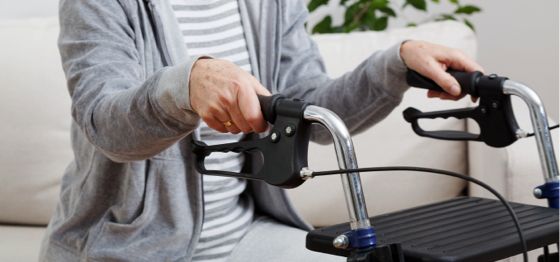Whether dealing with balance and stability challenges, or recovering from surgery, when it comes to choosing a walker, the variety of options and considerations may make that choice feel complicated. A doctor, physical therapist, or occupational therapist may be able to provide valuable help when choosing walkers for seniors.
What are walkers?
A walker is an assistive device that offers more support than a cane because it provides more points of contact with the ground, as well as support on both sides of the body.
Types of walkers for seniors
There are 3 main types of walkers: standard walkers, wheeled walkers and rollators.
Standard walkers
A standard walker has 4 nonskid, rubber-tipped legs. It must be picked up for movement. As compared to wheeled walkers and rollators, using a standard walker expends more energy. A recent study found that participants using standard walkers couldn’t walk as far as those using rollators.1
Wheeled walkers
A wheeled walker is a standard walker with wheels. Some have 2 wheels in front, while others have 3 or even 4 wheels. 2-wheeled walkers usually have 2 tennis balls or walker slides attached to the back legs to help the walker move smoothly. The wheels generally roll forward or backward only. If the user needs to move laterally or turn around, the walker must be lifted.
Rollators
A rollator may have 3 or 4 wheels. Some rollators have wheels that roll in all directions so users can turn around or move to the side without having to lift the device. Rollators also come with seats, a significant accommodation for those who become fatigued quickly.
Walker customization
Adaptations are available on walkers for seniors, specifically for users who have additional health challenges. For example, a stroke survivor may need added support to stand upright or control the walker. There are frames that attach to the walker to help hold the body upright. Assistive technology specialists are professionals who help individuals select the best walkers for seniors, providing information on adaptations for different needs.
What to look for in a walker
- Assess specific needs. If the walker needs to bear body weight, consider a standard walker. If a walker is needed for balance, or if the user experiences fatigue easily or has a lung condition, consider a rollator. The weight of the walker will be important for getting in and out of cars or maneuvering over curbs or on steps. In general, a rollator is heavier than a standard walker.
- Find the right fit. Standard walkers are height-adjustable for anyone between 5’5” and 6’5” tall. Junior-sized walkers are available as well. Standard walkers are typically 25”-29” wide, but narrower and wider walkers are also available.2 The Mayo Clinic recommends standing inside the walker and relaxing arms at the sides of the body. The top of the walker grip should line up with the crease on the inside of the wrist.3
- Consider the accessories. Brakes on rollators help control walking speed on downward inclines and can lock the rollator in place if the user wants to sit on it. Some rollators have large, tight brakes that can be challenging for small or weak hands. Newer models have internal brake cables, but some older models have external cables, which can pose a fall risk for those with more severe balance issues. Make sure the grip is comfortable as well. Most walkers come with plastic grips, but consider foam grips or soft grip covers, especially for hands that tend to sweat. A larger grip may be suitable for those with arthritis, joint pain or nerve problems.
- Regular maintenance checks
Accessory structures like rubber tips, attached tennis balls, slides, hand grips, brakes and the screws and joints connecting the different parts of the walker will get loose or become worn when used on a daily basis for an extended period of time.
How much do walkers cost?
There is a wide range in price for walkers. As of February 2022, standard walkers start at $30 and can run as high as $100. Wheeled walkers range from $50 to $250 for high-end models, and rollators can range from $70 to $600.4
How to persuade someone to use a walker
People may be be resistant to using walkers. Make sure that the walker is the right height and chosen for the mix of features that will make it not only comfortable but also enjoyable to use. Physical therapists may provide tips on how to use a walker efficiently and ergonomically.
It’s also useful to consider that walkers not only help prevent falls and injury5, but they may help maintain an active lifestyle by providing a safe way to stay mobile. Rollators with seats provide more independent access to malls, movie theaters, family events and sports fields, allowing enjoyment of activities that may have been avoided without the use of a walker.
Does insurance cover the cost of a walker?
Medicare and most private insurances cover all or a portion of the cost of a walker, with some exceptions. Some private insurance plans only cover the cost of a standard walker—not rollators. Others cover the cost of a rollator if a physical therapist or physician can document why the rollator is medically necessary. It’s best to check with your insurance company about your specific coverage before purchasing a walker.
Finding the right walker to fit user’s needs can help them stay mobile and independent for years. Evaluating options, consulting professionals for help and learning the proper techniques for safely using a walker are important parts of the selection process.
Go365 by Humana® makes wellness fun and easy. We help Humana Medicare members with Go365® on their plan reach health goals as well as take care of their physical and emotional health—allowing members to thrive at any age.
Humana Medicare members with Go365 on their plan can enroll in Go365 at
Go365 is a well-being and rewards program for many Humana Medicare Advantage members. To learn more about Humana Medicare Advantage, call to speak with a licensed Humana sales agent at 1-844-321-5843 (TTY:711), Monday – Friday, 8 a.m. – 8 p.m. local time or visit
If you need to enroll in Medicare Advantage or change your plan outside of the usual Medicare Annual Election Period, a Special Election Period (SEP) could be the answer. For information on eligibility, visit Humana’s
Sources:
1Farrah K. Li, “Walkers with Wheels Versus Walkers Without Wheels for Fall Prevention in Older Adults: A Review of the Comparative Clinical Effectiveness,” Canadian Agency for Drugs and Technologies in Health, last accessed June 18, 2022,
2"Walkers: How tu Use a Walker Correctly,” Seniors Flourish, last accessed July 28, 2022,
3“Healthy Lifestyle: Walker tips,” Mayo Clinic, last accessed June 18, 2022,
4Margaret Sellars, “How Much do Walkers Cost? (Standard, Wheeled, and Rollator Walkers),” Mobility Deck, last accessed June 18, 2022,
5“3 Ways to Prevent Falls With Your Walker,” ECRC Physical Therapy, last accessed July 18, 2022,
Go365 is not an insurance product and is not available with all Humana health plans. This is a general description of services which are subject to change. Product features may vary by client. Please refer to Customer Support for more information.
Humana is a Medicare Advantage HMO, PPO and PFFS organization and a stand-alone prescription drug plan with a Medicare contract. Humana is also a Coordinated Care plan with a Medicare contract and a contract with the state Medicaid program. Enrollment in any Humana plan depends on contract renewal.




